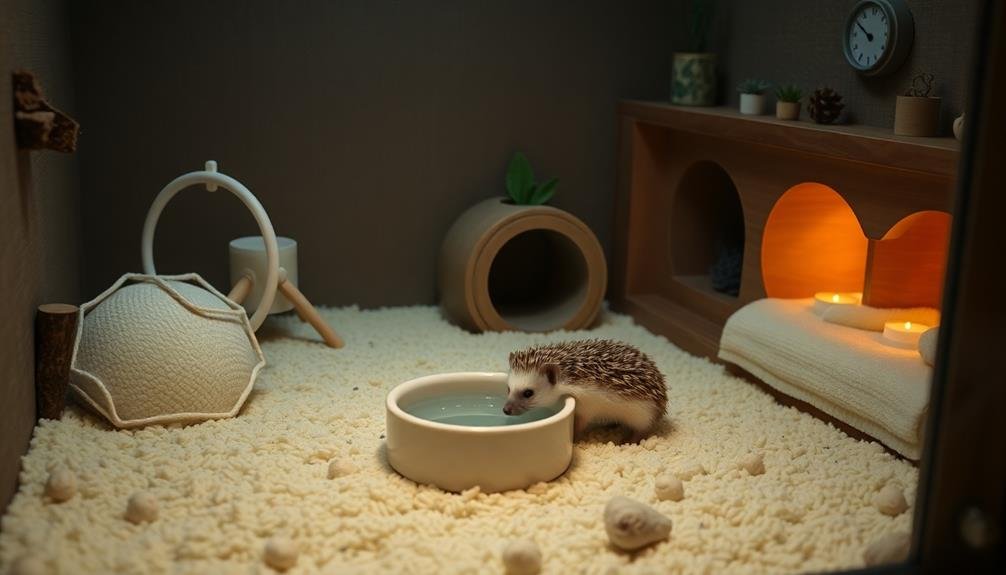Hedgehogs can be surprisingly effective companions for anxiety relief. These spiky little creatures offer comfort and companionship, helping to reduce stress and promote calmness. Their nocturnal nature aligns well with late-night anxiety symptoms, providing a soothing presence when you need it most. Caring for a hedgehog can give you a sense of purpose and routine, which is beneficial for managing anxiety. The tactile experience of petting their quills can be grounding and distracting from anxious thoughts. While they're not traditional therapy animals, hedgehogs can complement other anxiety treatments in unique ways. There's much more to discover about these prickly pals and their anxiety-relieving potential.
Understanding Hedgehogs as Emotional Support Animals

Increasingly, people are discovering the therapeutic benefits of hedgehogs as emotional support animals. These small, spiky creatures can provide comfort and companionship to those struggling with anxiety, depression, or other mental health issues. As nocturnal animals, hedgehogs are often active during evening hours when anxiety symptoms may intensify, offering a soothing presence when you need it most.
Hedgehogs' unique characteristics make them well-suited for emotional support roles. Their gentle nature and low-maintenance care requirements can reduce stress for owners. The act of caring for a hedgehog can provide a sense of purpose and routine, which is beneficial for managing anxiety.
Their quiet demeanor and small size make them ideal for those living in apartments or with limited space. While not as traditionally affectionate as dogs or cats, hedgehogs can form strong bonds with their owners. The tactile experience of petting their soft underbellies can be calming, and their curious personalities can offer distraction from anxious thoughts.
It's essential to recognize that hedgehogs require specific care and aren't legal pets in all areas, so research local regulations before considering one as an emotional support animal.
Benefits of Hedgehog Ownership for Anxiety
How can owning a hedgehog help alleviate anxiety? These spiky companions offer unique benefits that can greatly reduce stress and promote emotional well-being. When you care for a hedgehog, you'll establish a daily routine that provides structure and purpose, helping to keep anxious thoughts at bay.
The tactile experience of petting their soft underbellies can be soothing and grounding, while their quirky personalities offer a delightful distraction from worries. Hedgehogs require gentle handling, which encourages you to practice mindfulness and stay present in the moment.
Their nocturnal nature means they're active when you might feel most anxious, providing companionship during late-night hours. Watching your hedgehog explore its environment can be both entertaining and calming, offering a welcome respite from anxiety-inducing thoughts.
Caring for a hedgehog also fosters a sense of responsibility and accomplishment, boosting your self-esteem and confidence. Their low-maintenance nature makes them ideal for those who may feel overwhelmed by more demanding pets.
Additionally, the unique bond you'll form with your hedgehog can provide unconditional love and support, essential elements in managing anxiety effectively.
Setting Up a Hedgehog Habitat

To create a comfortable home for your anxiety-relieving hedgehog, you'll need to start with the right enclosure and essential accessories.
You'll want to choose a spacious cage with proper ventilation and secure it with appropriate bedding, hiding spots, and exercise equipment.
Don't forget to maintain the correct temperature and lighting conditions to keep your hedgehog healthy and happy.
Choosing the Right Enclosure
Your hedgehog's home is essential for its well-being and your peace of mind. When choosing an enclosure, opt for a spacious cage that's at least 2 feet by 2 feet, with a minimum of 4 square feet of floor space. Larger is always better, as hedgehogs love to explore and exercise.
Select a cage with smooth, solid sides to prevent climbing and potential injuries. Wire-bottom cages are a no-go, as they can hurt your hedgehog's feet. Instead, choose a cage with a solid, flat bottom. Plastic storage bins or specially designed hedgehog cages work well.
Ensure proper ventilation by selecting an enclosure with adequate air flow. Aquariums aren't recommended due to poor air circulation. Your hedgehog's home should have a secure, escape-proof lid to keep your curious pet safe.
Consider the cage's ease of cleaning when making your choice. Removable bottom trays or easily accessible interiors will make maintaining a hygienic environment simpler.
Essential Cage Accessories
Setting up a cozy and enriching habitat for your hedgehog involves more than just the enclosure itself. You'll need to include several essential accessories to guarantee your spiky friend's comfort and well-being.
First, provide a solid-surface exercise wheel, at least 12 inches in diameter, to satisfy your hedgehog's natural urge to run. Avoid wire wheels, as they can injure your pet's feet.
Next, add a hiding spot like a small pet igloo or fleece pouch where your hedgehog can retreat and feel secure.
For bedding, use fleece liners or paper-based, dust-free options. Avoid wood shavings, which can cause respiratory issues.
Include a shallow, heavy ceramic food dish and a water bottle or small bowl for hydration.
Offer various toys for mental stimulation, such as small plastic balls, PVC pipes, or toilet paper tubes.
Remember to provide a heat source, like a ceramic heat emitter, to maintain a consistent temperature between 72-80°F (22-27°C).
Lastly, don't forget a thermometer to monitor the habitat's temperature and a small litter pan if you plan to litter train your hedgehog.
Temperature and Lighting Needs
Maintaining proper temperature and lighting is essential for your hedgehog's health and happiness. Hedgehogs are sensitive to temperature fluctuations and require a consistent environment between 72°F and 80°F (22°C to 27°C).
It's vital to use a thermometer to monitor the cage temperature and adjust as needed. You'll need to provide a heat source, such as a ceramic heat emitter, to maintain warmth, especially during colder months.
Lighting is equally important for your hedgehog's well-being. These nocturnal creatures need a consistent day-night cycle to maintain their natural rhythms. Aim for 12-14 hours of light followed by 10-12 hours of darkness.
You can use a timer to automate this process and guarantee consistency.
Here are key points to remember for temperature and lighting:
- Use a ceramic heat emitter for warmth
- Install a thermometer to monitor cage temperature
- Provide 12-14 hours of light daily
- Guarantee 10-12 hours of darkness for proper sleep
- Use a timer to maintain a consistent day-night cycle
Hedgehog Diet and Nutrition Basics
When caring for your anxiety-relieving hedgehog, you'll need to understand their dietary needs.
You should focus on providing high-quality cat food as the main staple, supplemented with insects like mealworms or crickets.
It's essential to offer fresh water daily and feed your hedgehog at consistent times, typically in the evening when they're most active.
Staple Foods for Hedgehogs
A well-balanced hedgehog diet is vital for their health and well-being. As a hedgehog owner, you'll need to provide a variety of staple foods to guarantee your spiky friend receives proper nutrition.
Commercial hedgehog food should form the foundation of their diet, as it's specially formulated to meet their nutritional needs. Look for high-quality brands that list meat or meat meal as the first ingredient.
Supplement their diet with a mix of protein sources and fresh fruits and vegetables. Offer small amounts of cooked, lean meats like chicken or turkey. Insects are another important component, with mealworms and crickets being popular choices. Remember to gut-load these insects before feeding them to your hedgehog.
Here are some staple foods to include in your hedgehog's diet:
- Commercial hedgehog food
- Cooked, lean meats (chicken, turkey)
- Mealworms and crickets
- Small amounts of fruits (apples, berries)
- Vegetables (carrots, sweet potatoes)
Always provide fresh, clean water and avoid foods high in fat or sugar.
Proper Feeding Techniques
Now that you know what to feed your hedgehog, it's important to understand how to feed them properly. Offer food once or twice daily, preferably in the evening when hedgehogs are most active. Use shallow, heavy ceramic dishes to prevent tipping and place them in a quiet area of their enclosure.
Measure portions carefully to avoid overfeeding, which can lead to obesity. A typical adult hedgehog needs about 2-3 tablespoons of high-quality cat food or specialized hedgehog kibble daily. Supplement this with small amounts of fresh fruits and vegetables, and occasional insects as treats.
Always provide fresh, clean water in a separate dish or bottle. Clean food and water containers daily to prevent bacterial growth. If you're introducing new foods, do so gradually to avoid digestive upset.
Monitor your hedgehog's eating habits and adjust portions as needed. Weight fluctuations can indicate health issues, so weigh your pet regularly. Remove uneaten fresh foods after a few hours to prevent spoilage.
Handling and Bonding With Your Hedgehog

Gently approaching your hedgehog is the first step in building a strong bond. Speak softly and move slowly to avoid startling your spiky friend. Offer treats from your hand to encourage positive associations with your presence.
As your hedgehog becomes more comfortable, you can begin handling them for short periods.
To handle your hedgehog safely, scoop them up from underneath, supporting their entire body. Never grab them from above, as this mimics predator behavior. Hold them close to your body, allowing them to feel secure. Gradually increase handling time as your pet becomes more relaxed.
Bonding activities can include:
- Placing them in a playpen while you sit nearby
- Offering favorite treats during handling sessions
- Letting them explore a safe room under supervision
- Providing toys and tunnels for interactive play
- Using a soft brush to gently groom their quills
Daily Care Routine for Anxiety Relief
Establishing a consistent daily care routine for your hedgehog can greatly reduce their anxiety and promote overall well-being. Start by setting specific times for feeding, cleaning, and playtime. Feed your hedgehog at the same times each day, offering a balanced diet of high-quality cat food and insects. Clean their cage daily, removing waste and replenishing food and water.
Dedicate time for exercise and enrichment activities. Provide a safe, enclosed area for your hedgehog to explore outside their cage. Offer toys like tunnels, balls, and hiding spots to stimulate their mind and encourage natural behaviors. Engage in gentle handling sessions to strengthen your bond and help your hedgehog feel more comfortable with human interaction.
Monitor your hedgehog's behavior and health closely. Look for signs of stress or discomfort, such as excessive huffing or hiding. Maintain a consistent temperature in their environment, ideally between 72-80°F (22-27°C). Keep their living space away from drafts and sudden noises.
Hedgehog Health and Veterinary Care

As a hedgehog owner focused on anxiety relief, you'll need to be aware of common health issues like obesity, mite infestations, and dental problems.
It's essential to find a veterinarian who specializes in exotic pets, particularly hedgehogs, as they require unique care.
Regular check-ups and prompt attention to any changes in behavior or appearance will help guarantee your hedgehog stays healthy and continues to provide anxiety relief.
Common Hedgehog Health Issues
Hedgehog owners should be aware of several common health issues that can affect their spiky companions. These issues range from minor to severe, and early detection is vital for effective treatment.
Obesity is a prevalent problem due to overfeeding and lack of exercise, which can lead to more serious health complications. Dental problems, including tooth decay and gum disease, are also common and require regular check-ups.
Respiratory infections can occur if hedgehogs are exposed to drafts or sudden temperature changes. Skin issues, such as mites or fungal infections, may cause excessive scratching or quill loss. Additionally, hedgehogs are prone to certain tumors, particularly in their later years.
To keep your hedgehog healthy, watch for these signs:
- Sudden weight gain or loss
- Changes in eating or drinking habits
- Lethargy or decreased activity
- Abnormal droppings or difficulty urinating
- Quill loss or changes in skin appearance
Regular vet visits, proper nutrition, and a clean living environment are fundamental for maintaining your hedgehog's health.
If you notice any unusual symptoms or behaviors, consult your veterinarian promptly to guarantee your spiky friend receives the necessary care.
Finding Specialized Exotic Vets
Given the unique health needs of hedgehogs, finding a veterinarian with expertise in exotic pets is essential. Not all vets have experience treating hedgehogs, so you'll need to do some research to locate a qualified professional in your area.
Start by searching online for "exotic pet veterinarians" or "hedgehog specialists" in your city or region. You can also check with local hedgehog rescue organizations or breeder associations for recommendations.
Once you've identified potential vets, call their offices to inquire about their experience with hedgehogs. Ask about their training, how many hedgehogs they've treated, and what specific health issues they're familiar with.
It's vital to find a vet who understands hedgehog-specific concerns like hibernation attempts, dental problems, and mite infestations.
Consider scheduling a meet-and-greet appointment to assess the vet's knowledge and comfort level with hedgehogs. During this visit, observe how they handle your pet and whether they can answer your questions confidently.
Don't hesitate to travel a bit farther for a truly qualified exotic vet – your hedgehog's health is worth the extra effort.
Enrichment Activities for Hedgehogs
Enriching your hedgehog's environment is imperative for their mental and physical well-being. These curious creatures thrive on stimulation and exploration, so it's essential to provide them with a variety of activities.
Start by creating a diverse habitat with different textures, hiding spots, and climbing opportunities. Incorporate toys like small balls, tunnels, and puzzle feeders to keep them engaged.
Regular exercise is important for hedgehogs, so consider providing a safe running wheel or creating an enclosed play area. Encourage their natural foraging instincts by hiding treats around their enclosure or using treat-dispensing toys. Supervised playtime outside their cage can also be beneficial, allowing them to explore new scents and textures.
Here are some enrichment ideas to try:
- Set up a shallow water dish for supervised splashing
- Offer safe, natural materials like leaves or grass for exploration
- Introduce new scents with herb-scented toys or fabrics
- Create obstacle courses with tunnels and ramps
- Provide soft, fleece blankets for burrowing
Remember to rotate toys and activities regularly to prevent boredom and maintain your hedgehog's interest. By offering a stimulating environment, you'll help keep your spiky companion happy, healthy, and engaged.
Legal Considerations for Hedgehog Ownership

Before reflecting on hedgehog ownership, you'll need to navigate a maze of legal regulations that vary widely by location.
In some areas, hedgehogs are completely prohibited as pets, while others require specific permits or have strict ownership guidelines. It's essential to research your local and state laws thoroughly before bringing a hedgehog home.
Many U.S. states, including California, Georgia, and Hawaii, have banned hedgehog ownership outright. Other states may require you to obtain a special permit or license.
Even if hedgehogs are legal in your state, individual cities or counties might've their own restrictions.
You'll also need to contemplate the legality of transporting hedgehogs across state lines if you plan to move or travel with your pet. Some states require health certificates or quarantine periods for incoming hedgehogs.
If you're outside the U.S., check your country's exotic pet regulations. Many European countries have specific laws governing hedgehog ownership, and some may only allow native species as pets.
Hedgehog Therapy Vs Traditional Anxiety Treatments
While legal considerations are important, let's examine how hedgehog therapy compares to traditional anxiety treatments.
Hedgehog therapy, a form of animal-assisted therapy, offers a unique approach to managing anxiety. Unlike traditional treatments such as medication or talk therapy, interacting with hedgehogs provides a tactile and sensory experience that can be both calming and distracting from anxious thoughts.
Traditional treatments often focus on cognitive restructuring or altering brain chemistry, while hedgehog therapy taps into the emotional and physical aspects of anxiety relief. You'll find that petting a hedgehog's soft underbelly or watching it explore can provide immediate stress reduction and a sense of comfort.
Here's how hedgehog therapy differs from traditional treatments:
- Offers a non-verbal, sensory experience
- Provides immediate tactile comfort
- Requires no long-term commitment or side effects
- Encourages mindfulness and present-moment focus
- Can be combined with other treatments for enhanced effects
While hedgehog therapy shouldn't replace professional medical advice, it can be a valuable complement to your anxiety management toolkit.
Consider discussing this option with your healthcare provider to determine if incorporating hedgehog interactions could benefit your overall treatment plan.
Building a Hedgehog-Friendly Support Network

To truly benefit from hedgehog therapy, you'll need a support network that understands and embraces your unique approach to anxiety relief. Start by educating your friends and family about the benefits of hedgehog companionship. Share research and personal experiences to help them understand how these spiky friends can reduce stress and improve mental well-being.
Next, connect with other hedgehog enthusiasts through local meetups, online forums, or social media groups. These communities can offer valuable advice on hedgehog care, share success stories, and provide emotional support when needed. Don't forget to involve your healthcare provider in your hedgehog therapy journey, ensuring they're aware of and supportive of this complementary approach to managing anxiety.
| Support Network | Benefits | How to Engage |
|---|---|---|
| Family & Friends | Emotional support | Share information and experiences |
| Hedgehog Community | Practical advice | Join online groups and local meetups |
| Healthcare Provider | Professional guidance | Discuss hedgehog therapy in treatment plans |
Frequently Asked Questions
Can Hedgehogs Swim, and Do They Enjoy Water Activities?
Yes, hedgehogs can swim, but they don't typically enjoy water activities. You'll find they're capable swimmers if necessary, but it's not their preferred pastime. It's best to keep your hedgehog's water encounters brief and supervised.
How Long Do Hedgehogs Typically Live as Pets?
You'll typically enjoy your pet hedgehog for 4-6 years, though some may live up to 8-10 years with proper care. Their lifespan depends on diet, environment, and genetics. Regular vet check-ups can help extend their life.
Are Hedgehogs Nocturnal, and How Does This Affect Their Care Schedule?
Yes, hedgehogs are nocturnal. You'll need to adjust your care schedule accordingly. They're most active at night, so you should feed them and provide playtime in the evening. During the day, let them sleep undisturbed.
Can Hedgehogs Be Trained to Use a Litter Box?
You can train hedgehogs to use a litter box, but it takes patience. Start by placing a shallow tray with paper-based litter in their preferred bathroom spot. Reward them when they use it correctly, and they'll eventually catch on.
Do Hedgehogs Have a Distinctive Odor, and How Can It Be Managed?
Yes, hedgehogs have a musky scent. You can manage it by regularly cleaning their cage, using odor-absorbing bedding, and bathing them occasionally. Don't overdo baths, as it can dry out their skin. Good ventilation helps too.
In Summary
You've discovered the unique potential of hedgehogs as emotional support animals. They're small, low-maintenance, and can provide comfort for anxiety sufferers. Remember to create a suitable habitat, feed them properly, and engage in bonding activities. Check local laws before getting a hedgehog, and consider how they fit into your overall anxiety treatment plan. With proper care and understanding, your spiky companion can become an invaluable part of your support network and anxiety management strategy.





Leave a Reply